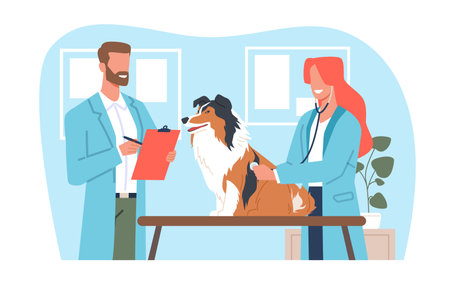1. Scheduling and Preparing for the Visit
Bringing your pet to the vet for the first time can feel overwhelming, but with a little preparation, you can make the experience smooth and stress-free. Here’s what you need to know about scheduling the appointment and getting everything ready.
How to Schedule Your Pet’s First Vet Appointment
When choosing a veterinarian, look for one that is reputable, conveniently located, and has good reviews from other pet owners. Once you’ve selected a vet clinic, follow these steps to schedule your pet’s visit:
- Call in Advance: Many veterinary offices are busy, so book an appointment as early as possible.
- Ask About New Patient Requirements: Some clinics may require paperwork or medical history before the visit.
- Choose a Low-Traffic Time: If possible, ask for a quieter time of day to help reduce stress for your pet.
What to Bring to Your Pet’s First Vet Visit
Your vet will need some important information about your pet’s health history. Be sure to bring the following items:
| Item | Description |
|---|---|
| Adoption or Breeder Records | Papers showing your pet’s age, breed, and any prior medical care. |
| Vaccination Records | If your pet has received any shots, bring proof of vaccination. |
| A List of Medications | If your pet is on any medications, note the names and dosages. |
| A Stool Sample (if requested) | Your vet may ask for this to check for parasites. |
| Your Pet’s Favorite Treats or Toy | This can help keep them calm during the visit. |
Helping Your Pet Stay Calm Before the Appointment
The first vet visit can be nerve-wracking for pets, but there are ways to ease their anxiety:
- Get Them Used to Their Carrier: If using a carrier, leave it out at home with treats inside so they associate it with positive experiences.
- Tire Them Out Beforehand: A short play session or walk can help release energy and reduce nervousness.
- Stay Calm Yourself: Pets can pick up on your emotions, so try to remain relaxed and reassuring.
2. What Happens During the Examination
When you take your pet to the vet for the first time, understanding what happens during the check-up can help ease any anxiety. A routine veterinary examination typically includes a few key steps that ensure your pet is healthy and receives the right care.
Physical Examination
The vet will perform a thorough physical exam to assess your pet’s overall health. This includes checking their eyes, ears, nose, mouth, skin, and coat. The vet will also listen to their heart and lungs with a stethoscope to detect any irregularities.
Weight and Vital Signs Check
Your pet’s weight is an important indicator of their health. The vet will weigh your pet and compare it to standard weight ranges for their breed and age. They may also check other vital signs such as temperature, heart rate, and respiratory rate.
Common Vital Sign Checks
| Vital Sign | Normal Range (for Dogs) | Normal Range (for Cats) |
|---|---|---|
| Temperature | 101-102.5°F (38.3-39.2°C) | 100.5-102.5°F (38-39.2°C) |
| Heart Rate | 60-140 bpm | 140-220 bpm |
| Respiratory Rate | 10-35 breaths per minute | 20-30 breaths per minute |
Discussion About Your Pet’s Health History
The vet will ask questions about your pet’s diet, exercise routine, behavior, and any past medical history. If you have any concerns or have noticed changes in your pet’s habits, this is a great time to bring them up.
Vaccinations and Preventative Care
If your pet needs vaccinations, the vet may administer them during this visit. They will also discuss flea and tick prevention, heartworm medication, and other preventative care options based on your pet’s lifestyle and risk factors.
Next Steps
After the examination, the vet may recommend follow-up appointments or additional tests if necessary. They might also provide advice on nutrition, training, or general wellness tips to keep your pet happy and healthy.
Your first veterinary visit is an important step in ensuring a long and healthy life for your pet. By understanding what to expect during the check-up, you can feel more prepared and confident about caring for your furry friend.

3. Vaccinations and Preventative Care
One of the most important aspects of your pets first veterinary visit is discussing vaccinations and preventative care. These measures help protect your pet from common diseases and health issues, ensuring a long and happy life.
Essential Vaccinations
Vaccines are a crucial part of your pet’s healthcare routine. Your veterinarian will recommend core vaccines based on your pet’s species, age, lifestyle, and risk factors. Below is an overview of essential vaccines for dogs and cats:
| Pet Type | Core Vaccines | Optional Vaccines |
|---|---|---|
| Dogs | Rabies, Distemper, Parvovirus, Adenovirus (Hepatitis) | Bordetella, Canine Influenza, Lyme Disease, Leptospirosis |
| Cats | Rabies, Feline Herpesvirus, Calicivirus, Panleukopenia | Feline Leukemia Virus (FeLV), Feline Immunodeficiency Virus (FIV) |
Parasite Prevention
Your vet will also discuss parasite prevention, which is essential in keeping your pet healthy. Fleas, ticks, heartworms, and intestinal parasites can cause serious health issues if left untreated. Common preventative treatments include:
- Flea & Tick Prevention: Topical treatments, oral medications, or collars that protect against infestations.
- Heartworm Prevention: Monthly chewable tablets or injections to prevent heartworm disease.
- Deworming: Regular deworming treatments to eliminate intestinal parasites like roundworms and hookworms.
Other Preventative Measures
Apart from vaccines and parasite control, there are additional steps you can take to keep your pet healthy:
- Nutritional Guidance: Feeding a well-balanced diet tailored to your pet’s specific needs.
- Dental Care: Establishing a dental hygiene routine to prevent gum disease and tooth decay.
- Regular Check-Ups: Scheduling annual exams to catch potential health problems early.
- Sterilization (Spaying/Neutering): Discussing with your vet when it’s best to spay or neuter your pet.
Your veterinarian will create a customized preventative care plan based on your pet’s unique needs. Following their recommendations will help ensure that your furry friend stays healthy and protected for years to come.
4. Discussing Nutrition and Daily Care
During your pet’s first veterinary appointment, the vet will take time to discuss their diet, exercise routine, and overall daily care. This is an essential part of ensuring your pet stays healthy and happy. Whether you have a young puppy, an adult cat, or a senior pet, understanding their nutritional needs and lifestyle requirements is key to their well-being.
Understanding Your Pet’s Nutritional Needs
Your veterinarian will ask about your pet’s current diet, including the type of food they eat, portion sizes, and feeding frequency. They may also recommend specific brands or dietary adjustments based on your pet’s breed, age, weight, and health conditions.
Common Nutritional Guidelines
| Pet Type | Recommended Diet | Feeding Frequency |
|---|---|---|
| Puppies/Kittens | High-protein diet with essential nutrients for growth | 3-4 times per day |
| Adult Dogs/Cats | Balanced commercial or vet-recommended diet | 2 times per day |
| Seniors | Easily digestible food with joint support ingredients | 2 times per day (adjusted as needed) |
The Importance of Exercise and Mental Stimulation
Your vet will also discuss the importance of regular exercise and mental stimulation for your pet. Exercise helps maintain a healthy weight, prevents boredom-related behaviors, and improves overall well-being.
Recommended Activity Levels by Pet Type
| Pet Type | Suggested Daily Exercise | Mental Stimulation Activities |
|---|---|---|
| Puppies/Dogs | 30 minutes to 2 hours (depends on breed) | Puzzle toys, training sessions, interactive play |
| Kittens/Cats | 15-30 minutes of active playtime | Cats trees, hunting games, laser pointers |
| Seniors (Dogs & Cats) | Mild daily walks or gentle play sessions | Scent games, slow-feeder bowls, light training exercises |
Caring for Your Pet’s Coat and Hygiene Needs
Your veterinarian may provide recommendations on grooming routines based on your pet’s coat type and hygiene requirements. Regular brushing, dental care, nail trimming, and ear cleaning are all essential parts of keeping your pet comfortable and healthy.
Bathing & Grooming Recommendations by Coat Type
| Coat Type | Brushing Frequency | Bathing Frequency | Nail Trimming Frequency |
|---|---|---|---|
| Short-haired Breeds (Dogs & Cats) | Once a week | Every 1-3 months (as needed) | Every 3-4 weeks |
| Long-haired Breeds (Dogs & Cats) | A few times a week to daily | Every 4-6 weeks (depends on coat condition) | Every 3-4 weeks |
| Sensitive Skin or Allergy-prone Pets | Avoid over-brushing if skin is irritated | Bathe only with vet-approved shampoos | Nail trims as needed to prevent overgrowth |
Your first vet visit is a great opportunity to learn about your pet’s specific needs when it comes to diet, exercise, and general care. By following the guidance provided by your veterinarian, you can help ensure your furry companion leads a long and healthy life.
5. Asking Questions and Next Steps
Your pet’s first veterinary visit is a great opportunity to ask important questions and get guidance on their care. Don’t hesitate to bring up any concerns you have, whether they’re about diet, vaccinations, training, or general health. Your vet is there to help you ensure your pet stays happy and healthy.
Common Questions to Ask Your Vet
If you’re unsure what to ask, here are some key questions that can help you better understand your pet’s needs:
| Topic | Suggested Questions |
|---|---|
| Diet & Nutrition | What type of food is best for my pet? How often should I feed them? |
| Vaccinations & Preventative Care | Which vaccines does my pet need? When should they receive them? |
| Training & Behavior | How can I address common behavior issues? Are there recommended training methods? |
| Parasite Prevention | How do I protect my pet from fleas, ticks, and heartworms? |
| Exercise & Activity | How much exercise does my pet need daily? |
| Soon-to-Be Procedures (Spaying/Neutering) | When is the right time to spay or neuter my pet? |
Your Pet’s Next Steps
Your vet will provide recommendations based on your pets health assessment. Here’s what to expect:
- Follow-up Appointments: If your pet needs additional vaccinations, booster shots, or check-ups, your vet will schedule these visits.
- Deworming & Flea Prevention: Your vet may prescribe medications to protect your pet from parasites.
- Nutritional Guidance: You might receive diet recommendations tailored to your pet’s age and breed.
- Treatment Plans:If any medical conditions are found, your vet will discuss treatment options.
- Puppy/Kitten Care Tips:If you have a young pet, you’ll get advice on socialization, training, and development milestones.
The Importance of Staying in Touch with Your Vet
Your veterinarian is your partner in keeping your pet healthy. Don’t be afraid to reach out if you notice changes in behavior, appetite, or energy levels. Regular check-ups and open communication with your vet will help ensure your furry friend has a long and happy life.


